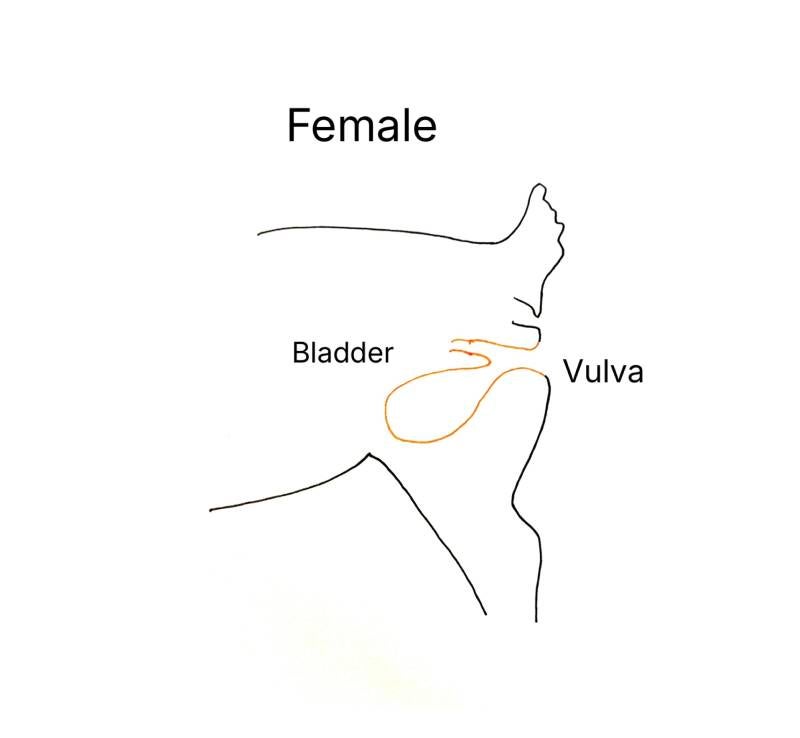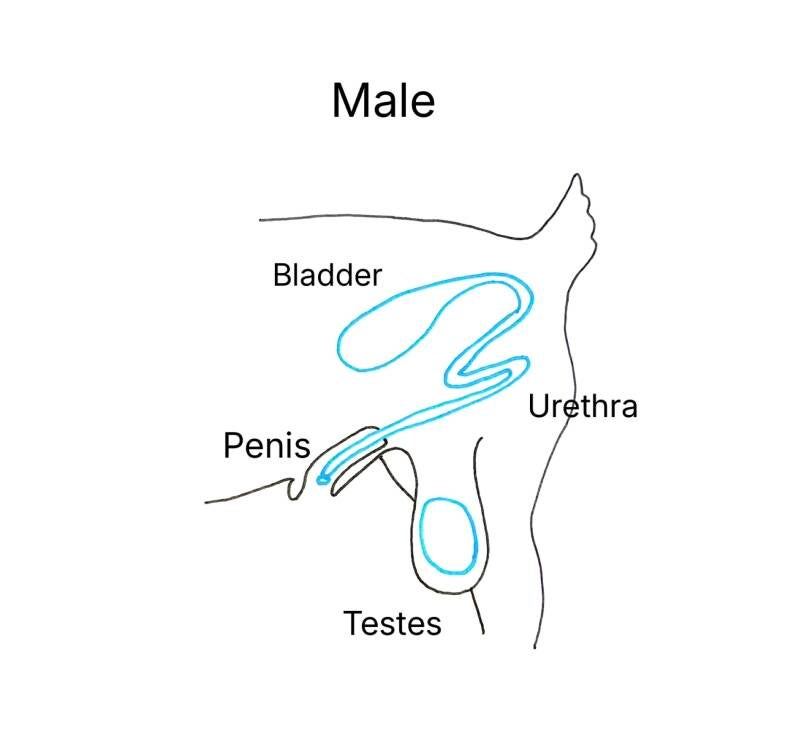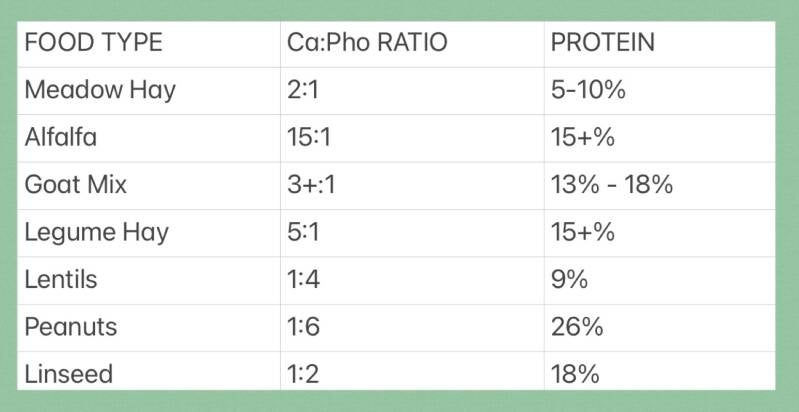
URINARY CALCULI
This is a terrible condition that isn’t widely known or understood. I’ve even heard people deny its existence! Often goat keepers and even vets are unaware of it or know very little and feed stockist rarely know of it at all. Feed manufacturers are still working with outdated information.
What is it?
Urinary calculi (also known as Urolithiasis, Calculosis or Water belly) is caused by crystals/stones/sludge in the bladder. These can get stuck in the urethra and if not treated in time in can cause the bladder to burst and, often, the animal will die.
Causes
- Goats, in the uk, are usually banded (castrated using a rubber band) at only a week old. But goats don’t reach sexual maturity until 3-6 months of age. Early banding prevents the urethra from reaching maturity so it remains narrow. This means that blockages are far more likely.
- Improperly balanced diet is just as much of a cause as castration, put the two together and it’s a double whammy. Improper feeding. It’s important to ascertain the calcium to phosphorus ratio of your feed, ideally it should be 2:1 like hay.
- Any food containing grain or grain byproducts are strictly off the menu. As are high calcium and high protein (anything above 12%) foods.
- Genetics can also play a part due to inherited physical traits and metabolic tendencies.
- Hard water will contain high levels of calcium and magnesium adding even more into their diet.
- Goats living in coastal areas with very sandy soil may be at risk of silica stones.
The images below demonstrate the huge difference between a female and male goats urinary tract.


Prevention
Surgical castration at a later date, 3-6 months, will go a long way towards preventing problems. But some goats have a genetic predisposition to a narrow urethra.
Diet
- Feeding good quality, long stemmed meadow hay not only aids digestion but the chewing of it encourages saliva production which helps balance minerals in their system.
- Avoid anything containing grain or grain byproducts
- Avoid protein content of over 12%
- Maintain a calcium to phosphorus ratio of 2:1 although small variations are ok (see the chart below for examples

Water
- Fresh, clean water is essential to flush through them through.
- Change their water at least once a day as goats do not like stale or dirty water and it will affect how much they drink.
- The bowl or trough you use will make a difference too, rubber is the best choice as plastic and metal can change the taste and the goat will likely drink less.
- Hard water can affect taste but can also affect their mineral intake. If you live in a hard water area it’s a good idea to get it tested and take steps to soften it if possible.
- During winter months your goats may drink less so it’s important to replace their water regularly with warm water or invest in a heated container.
Mineral and salt intake
- A selection of salt and mineral licks should be made available for you goat to select. These will enable your goat to self regulate their mineral intake and the salt will encourage them to drink even more.
- Loose minerals contain wheat and are too high in calcium and magnesium so are not suitable. They are aimed at milking goats.
- Avoid smallholder blocks due to calcium/phosphorous ratio, molasses and urea (they also don’t contain copper which is essential to goats)
Ammonium chloride - ALWAYS CONSULT YOUR VET BEFORE ADMINISTERING.
- Can help balance the ph of the goats rumen and acidify the urine.
- This can help prevent or break down any struvite crystals formed by the intake of too much phosphorus.
- It doesn’t affect calcium or silica stones. Using it too often can ultimately cause calcium stones.
- Pulse dosing with ammonium chloride will help break down any crystals before they can cause any harm.
- Every 3 months give each goat a dose of ammonium chloride once a day for a week (your vet will be able to tell you how much to dose based on your animals weight)
- By pulse dosing you can blast any struvite stones that may be building up while maintaining the correct PH balance and therefore avoiding build up of calcium stones.
**It's important to note that ammonium chloride will not break down stones caused by hard water and could, in fact, make it worse. Always speak to your vet before administering it**
Exercise
- It is important your goats stay active, exercise keeps their bodies working well
- It can encourage the bladder to eliminate smaller crystals and sludge before they become an issue
Controlling grazing
- In doing this you can have more control over how much rich food
- Helps minimise the amount of protein from grass
- In coastal areas, where the soil is sandy, will help reduce the risk of silica stones.
Symptoms
- Straining as if constipated, straining to pee.
- Hunched back, also straining to pee.
- Loss of appetite.
- Teeth grinding and ‘shouting’
- Restlessness, laying down and getting up to pace before laying down again.
- Stretching and thrusting.
- Shivering.
- Swollen and hard abdomen.
- Tail twitching and or tail held high.
- Crystals or blood stained urine on the opening to their penis.
- Unexplained scouring.
Treatment
It is vital that you call your vet immediately if you suspect your goat is struggling to relieve themselves.
- Ammonium chloride will likely be one of the first things to treat your goat with. Again your vet will work out the dosage. It will be quite a high dose and you’ll need to watch for signs of bloating and treat accordingly.
- They will likely be given a cocktail of drugs such as anti inflammatories, antibiotics and buscopan (a muscle relaxant) and after a while your goat will likely get some relief and comfort. Try to catch a urine sample at this point if you can as the vet can check it for signs of crystals.
- An ultrasound may be performed to see if there are any obvious signs of stones, the vet will also be able to see if the bladder is distended.
- Catheterisation may be an option, this isn’t done in the usual way because the length of the urethra makes it impossible, your goat will be sedated and a needle passed through to the bladder to draw out as much urine as possible. This will give your goat some relief, minimise the risk of their bladder rupturing and allow all the medication and ammonium chloride to run through the system quicker.
Surgical options may be discussed if your goat is considered a suitable candidate and if the vet thinks it will help them:
- Urethral Process Amputation is a procedure done under local anaesthetic or sedation and the tip of penis is removed.
- Tube Cystostomy is when a tube is place directly into the bladder bypassing the urethra.
- Perineal Urethrostomy is when the urethra is rerouted to exit as a females would.
These options can cost up to several thousand pounds, are not always successful, have extremely long recovery times and aren’t guaranteed to extend their life a great deal.
Obviously there are goats that have been very successfully treated through surgery and go on to lead a healthy life. But it’s important to talk to your vet about all of the options available to you, talk to your family and, unfortunately, sometimes that will mean choosing to end their suffering and allow them to be put to sleep.
Create Your Own Website With Webador